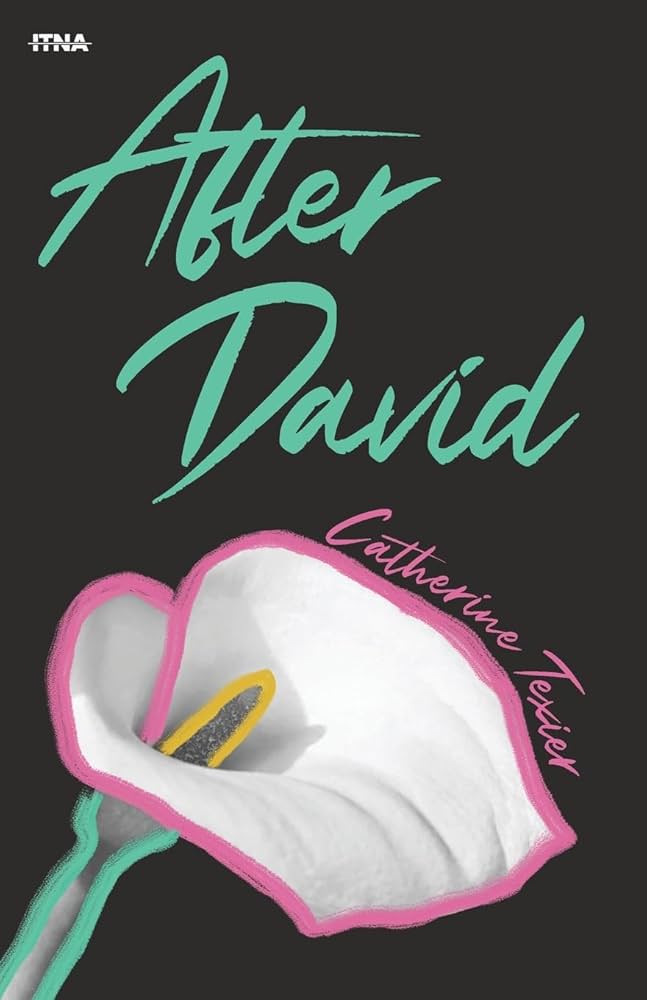
[ITNA Press; 2024]
In the long wake of her twenty-two year marriage to David, Eve—a sixty-two-year-old writer and French expatriate residing in New York City—takes up online dating. The site yields flirtation and a smattering of stimulating dalliances, and it presents Eve with Jonah: a thirty-seven-year-old jazz guitarist with “a flop of dark hair” who comes to haunt Eve’s fantasies for the next two years.
Eve and Jonah’s protracted love affair is the central engine of After David, the latest novel from multigenre writer Catherine Texier. Every page revolves around Jonah: his advances, his sensuality, and his chronic unavailability. He texts Eve, asks to see her, and cancels before she has a chance to respond. He sends her links to sexy lingerie and then is taken aback when she actually purchases them. He joins her in concocting schemes about where they would meet and what they would do, but when Eve invites him to make good on his insinuations, “he vanishe[s] into the cyber void.”
Partway through the book, a French film producer reaches out to Eve regarding a possible screenplay adaptation of her most recent book: The Way We Lived, a novel about her divorce from David. When Eve’s not working on the screenplay, she pours her creative energy into a novella about whatever’s happening with Jonah, which she starts writing after a discussion with her platonic, on-again, off-again housemate and former lover, Alan. An Englishman and Eve’s age-mate, Alan joins her in puzzling over the strange dating habits of the Americans. “As fellow Europeans,” Texier writes, “we loved to puzzle over the oddities of the natives, in particular the strange puritanism that lurks in the deepest recesses of a society that can be also provocatively raunchy. Or maybe it was a Generation X thing?”
Despite—or because of—Jonah’s inconsistency, their affair enlivens Eve. “Since I had met Jonah,” she observes, “I lived in a state of permanent arousal, of blissful desire, of heightened focus.” This astounding presence, this fine-tuning of the senses, is what drives Eve to the page. “I wanted to capture that state of desire, of constant expectation,” she narrates, “even if it turned out to be only the shimmering reflections of a dream.”
Eve takes her novella to her writing group, and the men of the cohort eviscerate her draft. It is the first piece she has shared with them. Their placid gathering in East Williamsburg is backlit by Eve’s memories of the past: “I had gone to these warehouses ten years ago [. . .] when Williamsburg was all abandoned industrial spaces taken over by artists who had turned them into rough studios with cold water and a hot plate. Parties went on all night—raves fueled by MDMA.” Unfortunately for Eve, the critique session is devoid of ecstasy. Collectively, the men in the group disembowel the novella’s central character (a lightly-fictionalized avatar for the narrator, Eve, in a presumably autofictional novel). “What young guy would possibly desire her?” asks one writer, a forty-something gay man with heterochromatic eyes. “Doesn’t make sense. He would be repulsed by her.” Texier’s visceral rending of the critique group would make any writer’s skin go cold, as she dramatizes the humiliations of the “cone of silence,” when a writer being workshopped must take limitless criticism without complaint or recourse. Throughout the scene, Eve tries to distract herself by concentrating on her beer, which happens to be called “Raging Bitch.” The men in Eve’s workshop (who dominate the conversation such that the women’s comments are reduced to marginalia) demand that she either “face her age [. . .] or else she could head straight to self-destruction. Suicide.” In this scene, Texier captures the polarization and the punishment that follow a woman’s articulation of desire.
Age, and the pronounced age difference between Eve and Jonah (twenty-five years), is one of the book’s major themes, but it feels overshadowed by Jonah’s fuckboy typification, which transcends age. Ultimately, it’s not their age difference that annihilates their intimacy, but Jonah’s noncommittal nature, exacerbated by other commitments that he seems to be hiding. It’s not until about halfway through the book that he admits to Eve he’s in an unresolved marriage. They’re separated, he claims, but still see each other. In a later scene, he references her having been in town one of the evenings that Eve wanted to get together.
In a way, Jonah’s evasiveness and borderline impropriety invert the circumstances of Eve’s divorce, twelve years earlier. David cheated on her with a younger woman. Eve ran into them out walking in the city one day. She recounts his final, fiery storm down their rent-controlled apartment’s steps, and one particularly upsetting time he tried to force himself on her when he came back to babysit. Jonah, early in the novel, tells Eve that he predicts “it would play out like an affair rather than a romance.” The “affair” label persists throughout the book. Eve seems to associate the term with a certain sexual gratuitousness—“I didn’t know whether I was disappointed or aroused,” she says, “the two sensations blending in an explosive mix”—but their exchanges are haunted by the specter of her late marriage, to the point that Eve seems to be engaging in an anachronistic infidelity. One afternoon late in their saga, Jonah notes that he’s gained weight. Eve acknowledges it, then reflects, “In a few years, he would slip down the other side of middle age and grow a potbelly. Not that I would get to see it. Our affair would have long ended by then.
“I remembered David at that age exactly.” For the duration of the novel, Eve seems unable to participate in her life without hearing the echoes of her marriage. “Ever since I met Jonah,” she notes, “David is everywhere.” Her immersion in the past is physical as well as mental: Eve’s apartment, formerly the family home, remains much the same as it did when David lived there, and his tastes ruled the space. Eve hires a feng shui expert to help her reinvigorate the apartment. The consultant’s presence in the book accomplishes what her expertise is meant to deliver: a sense of spaciousness, better composition, a freer flow of energy. The changes that Eve makes in her space become straightforward correlatives for her relationship with Jonah. The night that Eve declares in her heart things are over between them, “one of the two red hearts I had placed on the windowsill fell down and broke into tiny pieces.”
After David plays into the zeitgeist of women writing about post-menopausal desire and agency. The divorce memoir is having a moment, as Parul Sehgal points out in her New Yorker essay, “Divorce Story,” which concentrates on Sarah Manguso’s novel, Liars. Sehgal groups “memoirs by Leslie Jamison, Maggie Nelson, and Lyz Lenz” along with Miranda July’s All Fours and Kimberly King Parsons’ We Were the Universe, as a wave of “stories that are very often about self-understanding, about locating and reasserting an essential identity that’s drowning beneath the commotion of work and family life.” Eve, as a character, is entirely constrained by the roles she plays in her relationships. What, after all, is an essential identity separate from work and family life? If not for her constant ruminations about current and former lovers, her children, her parents, and her writing (which is often composed of these ruminations), who would Eve be?
Her grown daughter, Louise, moves out around the same time Eve begins seeing Jonah. “It was no coincidence,” Eve notes, “I had met Jonah [. . .] just as I was leaving behind the role of mother. That I would try to make him fill a void left by Louise’s moving out, Louise who had filled the void left by David’s absence.” Of course, her daughter moving out doesn’t mean that Eve leaves behind the role of mother. She continues to mother, and Louise continues to fret over her. Eve still seems trapped in her responsibilities to others. “I realize to my astonishment,” Eve says later, “that I’ve continued to play the same role with Louise as I did with David: on the defensive, apologetic for pursuing my career, for my ambition, for taking too much space . . .” She flouted society’s expectations during her marriage by relinquishing much of the domestic labor to her husband, but she never stops apologizing for it. Eve’s alleged feminism self-indicts, reaffirming traditional gender roles by demonstrating remorse for not fulfilling them.
Sehgal observes that many of these divorce stories pry open space for the protagonist to discover herself outside of external obligations, but Eve remains nearly devoid of selfhood outside of her relationships. She works, but her creative work revolves around men. She occasionally vacations with female friends (vacations that they spend drinking “to sexy, doomed, secret affairs”) or goes to work-related events—a book release, a party at a film professor’s apartment. Eve uses these parties as an excuse to gossip about Jonah and his family. Eve allows herself to be reduced to her obsession. Her French-ness, a kind of identitarian placeholder, is the closest Eve gets to her own distinctive traits, and her relationship to her home country is complicated (and often utilized for suggestive erotic fodder, in the messages she receives on the dating site). Even the book itself is titled after her ex-husband, a man who only appears in flashback.
Texier allows Eve to wrestle with how she fits into the madonna-whore dichotomy, “that constant swing between pure wife and naughty lover, the oldest story of romance as told by men in the Western world and perhaps in the whole history of humanity.” Eve oscillates between the two expressions, playing sexy with Jonah, reluctantly maternal with Louise. But is there an identity available to women not predicated on one’s relationship to men? Ultimately, the book arcs toward Eve learning to release what she cannot have: her children, her parents, and Jonah. Are men’s lives so dictated by their predetermined roles? I have not read the right novels to know.
Moreover, I was left wondering if I’ve read the right novels to interpret Texier’s work. She’s a French author, based in New York, where she teaches at the New School. The narrator shares many of these biographical details. Eve, like Texier, published a book about her divorce and dated, post-divorce, a Russian. Texier’s CV alternates between fiction and memoir, and in After David, Eve is incessantly referencing previous artistic works. The screenplay about her divorce undergirds her affair with Jonah: a reinterpretation of the marriage that has not yet ceased to define Eve’s life provides her creative lifeline out of an all-consuming obsession with this noncommittal middle-aged man. Towards the end of the novel, Vadik, Eve’s Russian ex-boyfriend, reappears. They’d broken up seven years prior, “when we fought about the book I had written about David. My writing,” Eve adds, “was always the specter that stood between me and men. Except David. At least, until he claimed that I had ruined his life with that book.” Texier’s hyper-referentialism about previously published material blurs the line of realism, and I felt like I was putting together a puzzle without all the pieces. Even without the comprehensive context of Texier’s full oeuvre, After David is a sensual meditation on women’s roles and the magnetism of attraction. Eve blunders through the kind of all-consuming fixation that knows no logic. Texier treats the duration of their affair like something inevitable, ordained. “Even the most tenuous relationships can touch you deep,” she writes, “precisely because they are so tenuous. Because they make you feel that there could be something else.”
McKenzie Watson-Fore serves as the executive editor for sneaker wave magazine and the inaugural critic-in-residence for MAYDAY. She holds an MFA in Writing from Pacific University, and her work has been published or is forthcoming in the Offing, Bridge Eight, Christian Century, and elsewhere. She can be found at MWatsonFore.com or drinking tea on her back porch.
This post may contain affiliate links.






